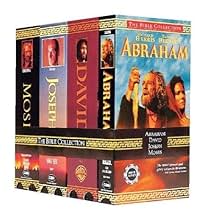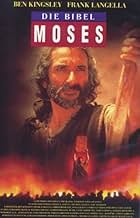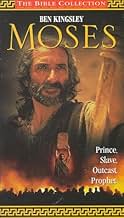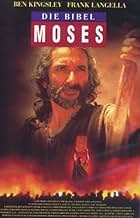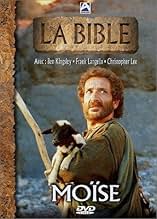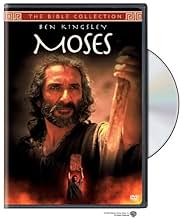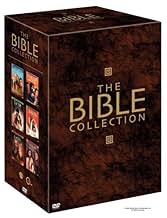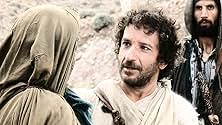IMDb RATING
6.7/10
2.4K
YOUR RATING
Pharaoh Ramses II decrees the death of all Hebrew children, but Moses, placed in a basket on the Nile by his mother, is picked up by a princess and raised as the brother of the heir to the t... Read allPharaoh Ramses II decrees the death of all Hebrew children, but Moses, placed in a basket on the Nile by his mother, is picked up by a princess and raised as the brother of the heir to the throne of Egypt.Pharaoh Ramses II decrees the death of all Hebrew children, but Moses, placed in a basket on the Nile by his mother, is picked up by a princess and raised as the brother of the heir to the throne of Egypt.
- Nominated for 1 Primetime Emmy
- 2 nominations total
Browse episodes
Featured reviews
an useful film. for discover Moses as simple man in extraordinaries situations. his humanity, his fear, his faith not as expression of power but as axis of mission. Ben Kingsley is not the hero or the special leader. his Moses is only a man. man of a high duty and the photography, costumes, precise measure of dialogs and scenes are inspired tools for discover , in different version, a well known story. a surprising form of poetry gives force to the film. a wise manner to suggest transforms the work of Kingsley and Suchet in a kind of embroidery. a film who not propose a myth. or a statue. but a simple man and his hard fight against himself, the sacrifice for his people. the result is admirable.
While Ben Kingsley is a great actor his adaptation of Moses is not one of his better roles. He simply is not believable as the great Hebrew leader. Regardless of this fact the movie is definitely worth watching.
This is at least the seventh version of the Biblical events encompassing the Hebrew exodus from Egypt and the laying down of God's law in the form of the Ten Commandments that I have checked out: the others were THE TEN COMMANDMENTS (1923 and 1956), MOSES THE LAWGIVER (1974; TV Mini-Series), the relevant three-part entry in GREATEST HEREOS OF THE BIBLE (1978-79; TV Series), the animated THE PRINCE OF EGYPT (1998) and, the most recent (and most radical), EXODUS: GODS AND KINGS (2014; in which the leading man here, Ben Kingsley, also features). Incidentally, the film under review itself forms part of a series, spanning 8 years and 17 TV-movies, collectively dubbed "The Bible Collection" - of which I am only familiar with Ermanno Olmi's GENESIS: THE CREATION AND THE FLOOD (1994), Nicolas Roeg's SAMSON AND DELILAH (1996) and director Young's own JESUS (1999).
Despite its 183-minute duration and the over-familiarity (not to mention, repetitiveness) of the proceedings, the pacing surprisingly only occasionally drags its feet throughout; that said, the brownish hue of the cinematography (sometimes undercut by more appealing bluish tones) lends the whole an unnecessary drabness! Anyway, the film brings together a reasonably competent crowd in the way of cast (albeit not all were readily discernible!) and crew: music consultant Ennio Morricone, Ben Kingsley (in the faithfully-rendered title role, having the same year already essayed the role of another Egyptian Hebrew, JOSEPH - also helmed by Young), Sonia Braga (her role of Moses' spouse Sephora is grossly underplayed!), Anna Galiena (as Moses' noble surrogate mother), Anthony Higgins, Frank Langella (as the new Pharaoh and Moses' former Egyptian 'brother'), Christopher Lee (briefly seen as the surly Ramses {sic}), Philippe Leroy, Enrico Lo Verso (as Joshua, Moses' successor), Geraldine McEwan (as Moses' sister Miriam), Maurice Roeves (as the inevitable opponent to Moses among his own people), Philip Stone (as Moses' father-in-law - occupying, oddly enough, a prominent part!), David Suchet (as Moses' brother Aaron) and Dudley Sutton.
Moses' life in Egypt is rather swiftly dealt with (a mere half an hour in, he has already embraced his Jewish faith!) - but, then, it goes farther than most after the climactic Ten Commandments 'incident' (notably, Miriam's turning against her own brother and its depiction of the demise of all three siblings). Ultimately, this is typically reverent fare (certainly in keeping with, and on the level of, the other entries in "The Bible Collection"): worthwhile - if mainly for the sake of comparison - and, while technically proficient enough, emerges as dramatically uninspired in the long run.
Despite its 183-minute duration and the over-familiarity (not to mention, repetitiveness) of the proceedings, the pacing surprisingly only occasionally drags its feet throughout; that said, the brownish hue of the cinematography (sometimes undercut by more appealing bluish tones) lends the whole an unnecessary drabness! Anyway, the film brings together a reasonably competent crowd in the way of cast (albeit not all were readily discernible!) and crew: music consultant Ennio Morricone, Ben Kingsley (in the faithfully-rendered title role, having the same year already essayed the role of another Egyptian Hebrew, JOSEPH - also helmed by Young), Sonia Braga (her role of Moses' spouse Sephora is grossly underplayed!), Anna Galiena (as Moses' noble surrogate mother), Anthony Higgins, Frank Langella (as the new Pharaoh and Moses' former Egyptian 'brother'), Christopher Lee (briefly seen as the surly Ramses {sic}), Philippe Leroy, Enrico Lo Verso (as Joshua, Moses' successor), Geraldine McEwan (as Moses' sister Miriam), Maurice Roeves (as the inevitable opponent to Moses among his own people), Philip Stone (as Moses' father-in-law - occupying, oddly enough, a prominent part!), David Suchet (as Moses' brother Aaron) and Dudley Sutton.
Moses' life in Egypt is rather swiftly dealt with (a mere half an hour in, he has already embraced his Jewish faith!) - but, then, it goes farther than most after the climactic Ten Commandments 'incident' (notably, Miriam's turning against her own brother and its depiction of the demise of all three siblings). Ultimately, this is typically reverent fare (certainly in keeping with, and on the level of, the other entries in "The Bible Collection"): worthwhile - if mainly for the sake of comparison - and, while technically proficient enough, emerges as dramatically uninspired in the long run.
it is not easy to present this Biblical episode. not only for special effects but for the right cast who reminds the profound nuances of Moses fight for his people, the relation with God and the vulnerability of a man who has victim of a huge mission. in this case all is at perfect place. the drama, the music, the acting, the hero looking the best manner to save the Jews. and the heart of that good job is the desire to not be another film about Moses and his people but a decent illustration of Saint Book story about a legendary leader. Ben Kingsley does an admirable role using each nuance of script at high level. result - more than an impressive religious film, it is a honest eulogy to freedom and to sacrifice as root of it. a film for a good series who translate in wise manner one of the great historical moments of ours cultural treasure.
The 1995 TV movie, "Moses," is mostly faithful to the Bible accounts that it covers in the exodus. It has six of the 10 plagues, and it has several of the events during the desert sojourn, including most of the major signs of God's power. It has good scenes of the Ark of the Covenant, the Tabernacle and the meeting tent, although there is no discussion of these.
It includes the important scouting of the Promised Land. God was ready to lead them into the land just a few months into the exodus, but the people balked. Ten of the 12 scouts said they would not be able to overcome the inhabitants who were there. The people didn't trust God to lead them in conquest of the land, so he condemned them to roam the desert for 40 years, until all those over age 20 had died.
I give this film six stars for its story accuracy during the exodus. It could have been a couple notches higher but for its shortcomings. The special effects are only fair. We see a short scene of the Red Sea after it has parted. When the Nile turns into blood, it looks as though a red filter is sliding over the camera lens. The earthquake seems more like the camera moving around while the people fall and slip.
One of the phenomenal things about the exodus was its sheer size. It involved two to three million people (based on Ex. 12:37). They set out with herds, flocks and belongings from Rameses, the great delta city that the Israelites had been building. This film fails to capture any of that. We see only a small area of adobe homes where the slaves live, and no sign of a great city. There are no scenes of masses of people. Most group scenes had no more than 100 people in them.
Another weak aspect is the story of the early years of Moses, and his adult character. The Bible is silent on most of the first 30 years of his life. It says only that he became the son of Pharaoh's daughter. As such, he would have been taught physical skills and the "art" of combat in the royal household. We see just a glimpse of that in a stick- fighting scene with his cousin. Otherwise, Moses is a clumsy child, withdrawn, and insecure. It's not likely that Moses would have known or visited his real family in his early years. Would Pharaoh have tolerated someone from the despised Israelite slaves as a member of the royal household? There is more in scripture and tradition that attest to the very unlikelihood of this.
Ben Kingsley's grown Moses is very good in his frequent internal conversations with God. But he is not the image of one who could rouse the people to follow him out of Egypt. In the Bible, Moses admits to not being an eloquent speaker, but that hardly equates to his being a lesser man physically. The scene of Moses at the well in Midian is quite novel. It seemed like another way to avoid his being portrayed as a strong man, physically or otherwise. But would Midian shepherds a few hundred miles away from the capitol of Egypt believe that this rag-tag character was from the royal Egyptian household? Or that an army of chariots had just crossed the desert and was about to put upon them? More likely, they would have thought he was an escaped thief. And, when Moses stays with Jethro's family for decades, he surely would encounter those same Midian shepherds in the days, weeks and years ahead. But where would Pharaoh's army be to back him up? No, I don't think much careful thought went into this character for Moses.
The film also is weak in the names of characters, including some who aren't named directly in the Book of Exodus. The first pharaoh in the film, when Moses is growing up, is Rameses I. But his tenure was less than three years. Most scholars think that Seti I was the pharaoh at that time. His reign was about 12 years. His son, Rameses II, was about 30 years old when he became pharaoh and was the chief builder of the glorious city, Rameses. And, he reigned for 67 years which would encompass the time that Moses was in Midian and then leading the exodus. The name of the pharaoh's daughter in this film is Ptiri, but I could find no reference to that name anywhere. In the film, the Pharaoh tells Moses that she died while he was gone. But a later Bible entry (1 Chronicles 4:17) lists Bithiah as "the daughter of Pharaoh." According to tradition, she was banished by Pharaoh for having brought Moses, an Israelite, into the house of the Pharaoh and pretending him to be her own. And, she left with Moses on the exodus – part of the "mixed multitude."
Some other Bible names are omitted, and fictitious names added. Zerack is a frequent complainer and critic of Moses in this movie. I can't find a reference to him anywhere. Dathan isn't mentioned at all, but in the Bible he, Korah and other leaders of the rebellion are swallowed up in the earthquake.
Many movies have been made about the exodus. This one is good for its account of the exodus itself, but not very good otherwise. I would like to see an exodus movie someday that has the account of the seraph snakes that bite and kill many of the Israelites for their constant grumbling against Moses and God. And then Moses making the bronze snake and putting it on a high pole for the people to gaze on and recover from their snake bites.
It includes the important scouting of the Promised Land. God was ready to lead them into the land just a few months into the exodus, but the people balked. Ten of the 12 scouts said they would not be able to overcome the inhabitants who were there. The people didn't trust God to lead them in conquest of the land, so he condemned them to roam the desert for 40 years, until all those over age 20 had died.
I give this film six stars for its story accuracy during the exodus. It could have been a couple notches higher but for its shortcomings. The special effects are only fair. We see a short scene of the Red Sea after it has parted. When the Nile turns into blood, it looks as though a red filter is sliding over the camera lens. The earthquake seems more like the camera moving around while the people fall and slip.
One of the phenomenal things about the exodus was its sheer size. It involved two to three million people (based on Ex. 12:37). They set out with herds, flocks and belongings from Rameses, the great delta city that the Israelites had been building. This film fails to capture any of that. We see only a small area of adobe homes where the slaves live, and no sign of a great city. There are no scenes of masses of people. Most group scenes had no more than 100 people in them.
Another weak aspect is the story of the early years of Moses, and his adult character. The Bible is silent on most of the first 30 years of his life. It says only that he became the son of Pharaoh's daughter. As such, he would have been taught physical skills and the "art" of combat in the royal household. We see just a glimpse of that in a stick- fighting scene with his cousin. Otherwise, Moses is a clumsy child, withdrawn, and insecure. It's not likely that Moses would have known or visited his real family in his early years. Would Pharaoh have tolerated someone from the despised Israelite slaves as a member of the royal household? There is more in scripture and tradition that attest to the very unlikelihood of this.
Ben Kingsley's grown Moses is very good in his frequent internal conversations with God. But he is not the image of one who could rouse the people to follow him out of Egypt. In the Bible, Moses admits to not being an eloquent speaker, but that hardly equates to his being a lesser man physically. The scene of Moses at the well in Midian is quite novel. It seemed like another way to avoid his being portrayed as a strong man, physically or otherwise. But would Midian shepherds a few hundred miles away from the capitol of Egypt believe that this rag-tag character was from the royal Egyptian household? Or that an army of chariots had just crossed the desert and was about to put upon them? More likely, they would have thought he was an escaped thief. And, when Moses stays with Jethro's family for decades, he surely would encounter those same Midian shepherds in the days, weeks and years ahead. But where would Pharaoh's army be to back him up? No, I don't think much careful thought went into this character for Moses.
The film also is weak in the names of characters, including some who aren't named directly in the Book of Exodus. The first pharaoh in the film, when Moses is growing up, is Rameses I. But his tenure was less than three years. Most scholars think that Seti I was the pharaoh at that time. His reign was about 12 years. His son, Rameses II, was about 30 years old when he became pharaoh and was the chief builder of the glorious city, Rameses. And, he reigned for 67 years which would encompass the time that Moses was in Midian and then leading the exodus. The name of the pharaoh's daughter in this film is Ptiri, but I could find no reference to that name anywhere. In the film, the Pharaoh tells Moses that she died while he was gone. But a later Bible entry (1 Chronicles 4:17) lists Bithiah as "the daughter of Pharaoh." According to tradition, she was banished by Pharaoh for having brought Moses, an Israelite, into the house of the Pharaoh and pretending him to be her own. And, she left with Moses on the exodus – part of the "mixed multitude."
Some other Bible names are omitted, and fictitious names added. Zerack is a frequent complainer and critic of Moses in this movie. I can't find a reference to him anywhere. Dathan isn't mentioned at all, but in the Bible he, Korah and other leaders of the rebellion are swallowed up in the earthquake.
Many movies have been made about the exodus. This one is good for its account of the exodus itself, but not very good otherwise. I would like to see an exodus movie someday that has the account of the seraph snakes that bite and kill many of the Israelites for their constant grumbling against Moses and God. And then Moses making the bronze snake and putting it on a high pole for the people to gaze on and recover from their snake bites.
Did you know
- TriviaSir Ben Kingsley appeared in another Moses related movie, Exodus: Gods and Kings (2014).
- ConnectionsFollowed by Samson et Dalila (1996)
- How many seasons does Moses have?Powered by Alexa
Details
- Release date
- Countries of origin
- Official site
- Language
- Also known as
- Moses
- Filming locations
- Production companies
- See more company credits at IMDbPro
- Runtime
- 1h 34m(94 min)
- Sound mix
- Aspect ratio
- 1.33 : 1
Contribute to this page
Suggest an edit or add missing content


